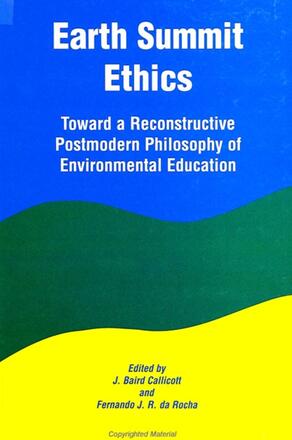
Earth Summit Ethics
Toward a Reconstructive Postmodern Philosophy of Environmental Education
Alternative formats available from:
An international group of environmental philosophers and educators propose ways universities can produce and promote ecological literacy and environmental ethics.
Description
On the eve of the 1992 Earth Summit in Rio de Janeiro, Fernando J. R. da Rocha challenged environmental philosophers to suggest and develop effective ways in which universities might engender ecological literacy and environmental ethics. The result was a preconference held in Porto Alegre, Brazil, whose aim was to put the summit in philosophical perspective, influence its outcome, and chart a new course, linking environment and ethics through university education.
This book is an outgrowth of the Porto Alegre conference, and the international environmental philosophers and educators represented here inaugurate a constructive dialogue that will continue well into the twenty-first century. Among the contributors to the volume are environmental philosophers Andrew Brennan, J. Baird Callicott, Fernando J. R. da Rocha, and Holmes Ralston, III, and education theorists Peter Madsen and John Lemons. In addition, the book introduces English-language readers to the work of French philosopher Catherine Larrere, Spanish philosopher Nicholas Sosa, and Brazil's radical former Secretary for the Environment and deep ecologist Jose Lutzenberger.
J. Baird Callicott is Professor of Philosophy at the University of North Texas and the University of Wisconsin--Stevens Point. Among his many books are In Defense of the Land Ethic: Essays in Environmental Philosophy and (with Roger T. Ames) Nature in Asian Traditions of Thought: Essays in Environmental Philosophy, both published by SUNY Press. Fernando J. R. da Rochais Associate Professor in the Department of Philosophy at the Universidade Federal do Rio Grande do Sul in Brazil.
Reviews
"With scientists laying the genetic basis for a re-emergent sociobiology and others promoting the globalization of artificial intelligence, it is a welcome relief to read this collection of essays by some of the most prominent environmental philosophers. Representing Atlantic Rim countries, these philosophers address the conceptual and moral double binds that characterize modernity's relationship to the environment. Their essays not only represent powerful critiques but also equally important guidelines for a constructivist approach to the cultural transitions now being dictated by the environmental crisis. " --C. A. Bowers, author of Educating for an Ecologically Sustainable Culture
"What I like most about this book is the diversity of positions on the issue of Earth ethics. The emphases of the articles are philosophical and ethical, but the discussions are not overspecialized or overly technical. The diversity of approaches is challenging but consistent with the 'postmodern' theme set in the title and introduction. The tension between some of the articles is engaging and representative of real creative tensions in the community of environmental concern. " -- John Grim, Bucknell University